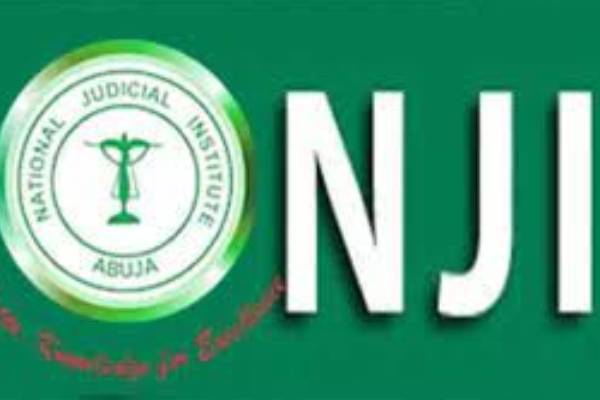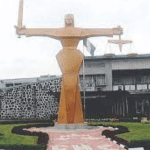The 2023 general elections is close at hand and there is need to ensure adequate reportage of judicial proceedings as well as proper scrutiny of information gotten from the courts before dissemination to the general public.
This was the consensus of the National Judicial Institute and Judicial correspondents at an Annual workshop organized by the Institute, in Abuja.
Elections are round the corner and it has become even more imperative that reportage of court proceedings are fair and balanced .
The court is saddled with the responsibility of handling cases filed by politicians and their sympathizers from pre to post election matters.
It is the responsibility of the judiciary correspondent to serve as the middle man between the court and the public, reporting the proceedings of the court, and distributing information impartially after proper verification
To achieve this there is need to ensure that these correspondent are equipped with relevant knowledge for Judicial reportage.
Annually the National Judicial institute carries out trainings for judiciary correspondent.
Due to the advent of the COVID 19 pandemic in 2020, the trainings were put on hold, but now with pandemic practically overcome, the NJI has decided to revive the trainings.
It has now organized a two day workshop for judiciary correspondents, designed to ensure coverage of court proceedings in strict adherence to the ethics of the profession.
On its part, the National Association of Judiciary Correspondents, calls for the absolute and financial autonomy of the judiciary.
It notes that the judiciary, being an arm of the government, should not need to present its budget to another arm of government, as this undermines the independence of the judiciary.
At the end of this training Judicial correspondents will be able to observe all ethical considerations that guide against excessive expression of opinion that could impinge on the integrity of the judiciary.
The 2023 general elections is close at hand and there is need to ensure adequate reportage of judicial proceedings as well as proper scrutiny of information gotten from the courts before dissemination to the general public.
This was the consensus of the National Judicial Institute and Judicial correspondents at an Annual workshop organized by the Institute, in Abuja.
Elections are round the corner and it has become even more imperative that reportage of court proceedings are fair and balanced .
The court is saddled with the responsibility of handling cases filed by politicians and their sympathizers from pre to post election matters.
It is the responsibility of the judiciary correspondent to serve as the middle man between the court and the public, reporting the proceedings of the court, and distributing information impartially after proper verification
To achieve this there is need to ensure that these correspondent are equipped with relevant knowledge for Judicial reportage.
Annually the National Judicial institute carries out trainings for judiciary correspondent.
Due to the advent of the COVID 19 pandemic in 2020, the trainings were put on hold, but now with pandemic practically overcome, the NJI has decided to revive the trainings.
It has now organized a two day workshop for judiciary correspondents, designed to ensure coverage of court proceedings in strict adherence to the ethics of the profession.
On its part, the National Association of Judiciary Correspondents, calls for the absolute and financial autonomy of the judiciary.
It notes that the judiciary, being an arm of the government, should not need to present its budget to another arm of government, as this undermines the independence of the judiciary.
At the end of this training Judicial correspondents will be able to observe all ethical considerations that guide against excessive expression of opinion that could impinge on the integrity of the judiciary.
The 2023 general elections is close at hand and there is need to ensure adequate reportage of judicial proceedings as well as proper scrutiny of information gotten from the courts before dissemination to the general public.
This was the consensus of the National Judicial Institute and Judicial correspondents at an Annual workshop organized by the Institute, in Abuja.
Elections are round the corner and it has become even more imperative that reportage of court proceedings are fair and balanced .
The court is saddled with the responsibility of handling cases filed by politicians and their sympathizers from pre to post election matters.
It is the responsibility of the judiciary correspondent to serve as the middle man between the court and the public, reporting the proceedings of the court, and distributing information impartially after proper verification
To achieve this there is need to ensure that these correspondent are equipped with relevant knowledge for Judicial reportage.
Annually the National Judicial institute carries out trainings for judiciary correspondent.
Due to the advent of the COVID 19 pandemic in 2020, the trainings were put on hold, but now with pandemic practically overcome, the NJI has decided to revive the trainings.
It has now organized a two day workshop for judiciary correspondents, designed to ensure coverage of court proceedings in strict adherence to the ethics of the profession.
On its part, the National Association of Judiciary Correspondents, calls for the absolute and financial autonomy of the judiciary.
It notes that the judiciary, being an arm of the government, should not need to present its budget to another arm of government, as this undermines the independence of the judiciary.
At the end of this training Judicial correspondents will be able to observe all ethical considerations that guide against excessive expression of opinion that could impinge on the integrity of the judiciary.
The 2023 general elections is close at hand and there is need to ensure adequate reportage of judicial proceedings as well as proper scrutiny of information gotten from the courts before dissemination to the general public.
This was the consensus of the National Judicial Institute and Judicial correspondents at an Annual workshop organized by the Institute, in Abuja.
Elections are round the corner and it has become even more imperative that reportage of court proceedings are fair and balanced .
The court is saddled with the responsibility of handling cases filed by politicians and their sympathizers from pre to post election matters.
It is the responsibility of the judiciary correspondent to serve as the middle man between the court and the public, reporting the proceedings of the court, and distributing information impartially after proper verification
To achieve this there is need to ensure that these correspondent are equipped with relevant knowledge for Judicial reportage.
Annually the National Judicial institute carries out trainings for judiciary correspondent.
Due to the advent of the COVID 19 pandemic in 2020, the trainings were put on hold, but now with pandemic practically overcome, the NJI has decided to revive the trainings.
It has now organized a two day workshop for judiciary correspondents, designed to ensure coverage of court proceedings in strict adherence to the ethics of the profession.
On its part, the National Association of Judiciary Correspondents, calls for the absolute and financial autonomy of the judiciary.
It notes that the judiciary, being an arm of the government, should not need to present its budget to another arm of government, as this undermines the independence of the judiciary.
At the end of this training Judicial correspondents will be able to observe all ethical considerations that guide against excessive expression of opinion that could impinge on the integrity of the judiciary.
The 2023 general elections is close at hand and there is need to ensure adequate reportage of judicial proceedings as well as proper scrutiny of information gotten from the courts before dissemination to the general public.
This was the consensus of the National Judicial Institute and Judicial correspondents at an Annual workshop organized by the Institute, in Abuja.
Elections are round the corner and it has become even more imperative that reportage of court proceedings are fair and balanced .
The court is saddled with the responsibility of handling cases filed by politicians and their sympathizers from pre to post election matters.
It is the responsibility of the judiciary correspondent to serve as the middle man between the court and the public, reporting the proceedings of the court, and distributing information impartially after proper verification
To achieve this there is need to ensure that these correspondent are equipped with relevant knowledge for Judicial reportage.
Annually the National Judicial institute carries out trainings for judiciary correspondent.
Due to the advent of the COVID 19 pandemic in 2020, the trainings were put on hold, but now with pandemic practically overcome, the NJI has decided to revive the trainings.
It has now organized a two day workshop for judiciary correspondents, designed to ensure coverage of court proceedings in strict adherence to the ethics of the profession.
On its part, the National Association of Judiciary Correspondents, calls for the absolute and financial autonomy of the judiciary.
It notes that the judiciary, being an arm of the government, should not need to present its budget to another arm of government, as this undermines the independence of the judiciary.
At the end of this training Judicial correspondents will be able to observe all ethical considerations that guide against excessive expression of opinion that could impinge on the integrity of the judiciary.
The 2023 general elections is close at hand and there is need to ensure adequate reportage of judicial proceedings as well as proper scrutiny of information gotten from the courts before dissemination to the general public.
This was the consensus of the National Judicial Institute and Judicial correspondents at an Annual workshop organized by the Institute, in Abuja.
Elections are round the corner and it has become even more imperative that reportage of court proceedings are fair and balanced .
The court is saddled with the responsibility of handling cases filed by politicians and their sympathizers from pre to post election matters.
It is the responsibility of the judiciary correspondent to serve as the middle man between the court and the public, reporting the proceedings of the court, and distributing information impartially after proper verification
To achieve this there is need to ensure that these correspondent are equipped with relevant knowledge for Judicial reportage.
Annually the National Judicial institute carries out trainings for judiciary correspondent.
Due to the advent of the COVID 19 pandemic in 2020, the trainings were put on hold, but now with pandemic practically overcome, the NJI has decided to revive the trainings.
It has now organized a two day workshop for judiciary correspondents, designed to ensure coverage of court proceedings in strict adherence to the ethics of the profession.
On its part, the National Association of Judiciary Correspondents, calls for the absolute and financial autonomy of the judiciary.
It notes that the judiciary, being an arm of the government, should not need to present its budget to another arm of government, as this undermines the independence of the judiciary.
At the end of this training Judicial correspondents will be able to observe all ethical considerations that guide against excessive expression of opinion that could impinge on the integrity of the judiciary.
The 2023 general elections is close at hand and there is need to ensure adequate reportage of judicial proceedings as well as proper scrutiny of information gotten from the courts before dissemination to the general public.
This was the consensus of the National Judicial Institute and Judicial correspondents at an Annual workshop organized by the Institute, in Abuja.
Elections are round the corner and it has become even more imperative that reportage of court proceedings are fair and balanced .
The court is saddled with the responsibility of handling cases filed by politicians and their sympathizers from pre to post election matters.
It is the responsibility of the judiciary correspondent to serve as the middle man between the court and the public, reporting the proceedings of the court, and distributing information impartially after proper verification
To achieve this there is need to ensure that these correspondent are equipped with relevant knowledge for Judicial reportage.
Annually the National Judicial institute carries out trainings for judiciary correspondent.
Due to the advent of the COVID 19 pandemic in 2020, the trainings were put on hold, but now with pandemic practically overcome, the NJI has decided to revive the trainings.
It has now organized a two day workshop for judiciary correspondents, designed to ensure coverage of court proceedings in strict adherence to the ethics of the profession.
On its part, the National Association of Judiciary Correspondents, calls for the absolute and financial autonomy of the judiciary.
It notes that the judiciary, being an arm of the government, should not need to present its budget to another arm of government, as this undermines the independence of the judiciary.
At the end of this training Judicial correspondents will be able to observe all ethical considerations that guide against excessive expression of opinion that could impinge on the integrity of the judiciary.
The 2023 general elections is close at hand and there is need to ensure adequate reportage of judicial proceedings as well as proper scrutiny of information gotten from the courts before dissemination to the general public.
This was the consensus of the National Judicial Institute and Judicial correspondents at an Annual workshop organized by the Institute, in Abuja.
Elections are round the corner and it has become even more imperative that reportage of court proceedings are fair and balanced .
The court is saddled with the responsibility of handling cases filed by politicians and their sympathizers from pre to post election matters.
It is the responsibility of the judiciary correspondent to serve as the middle man between the court and the public, reporting the proceedings of the court, and distributing information impartially after proper verification
To achieve this there is need to ensure that these correspondent are equipped with relevant knowledge for Judicial reportage.
Annually the National Judicial institute carries out trainings for judiciary correspondent.
Due to the advent of the COVID 19 pandemic in 2020, the trainings were put on hold, but now with pandemic practically overcome, the NJI has decided to revive the trainings.
It has now organized a two day workshop for judiciary correspondents, designed to ensure coverage of court proceedings in strict adherence to the ethics of the profession.
On its part, the National Association of Judiciary Correspondents, calls for the absolute and financial autonomy of the judiciary.
It notes that the judiciary, being an arm of the government, should not need to present its budget to another arm of government, as this undermines the independence of the judiciary.
At the end of this training Judicial correspondents will be able to observe all ethical considerations that guide against excessive expression of opinion that could impinge on the integrity of the judiciary.














